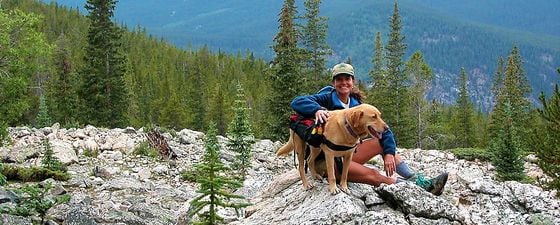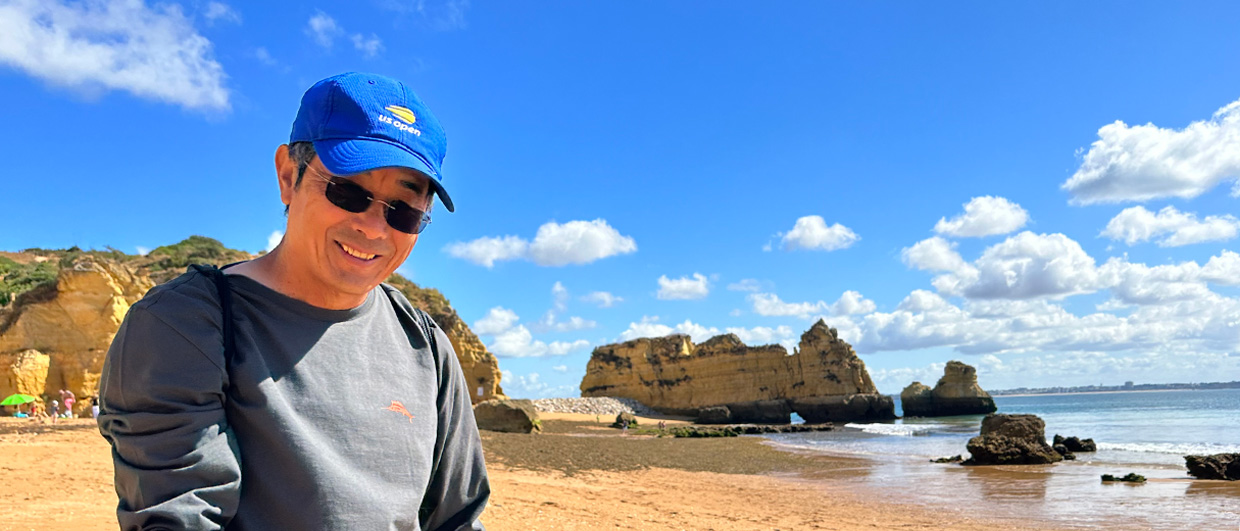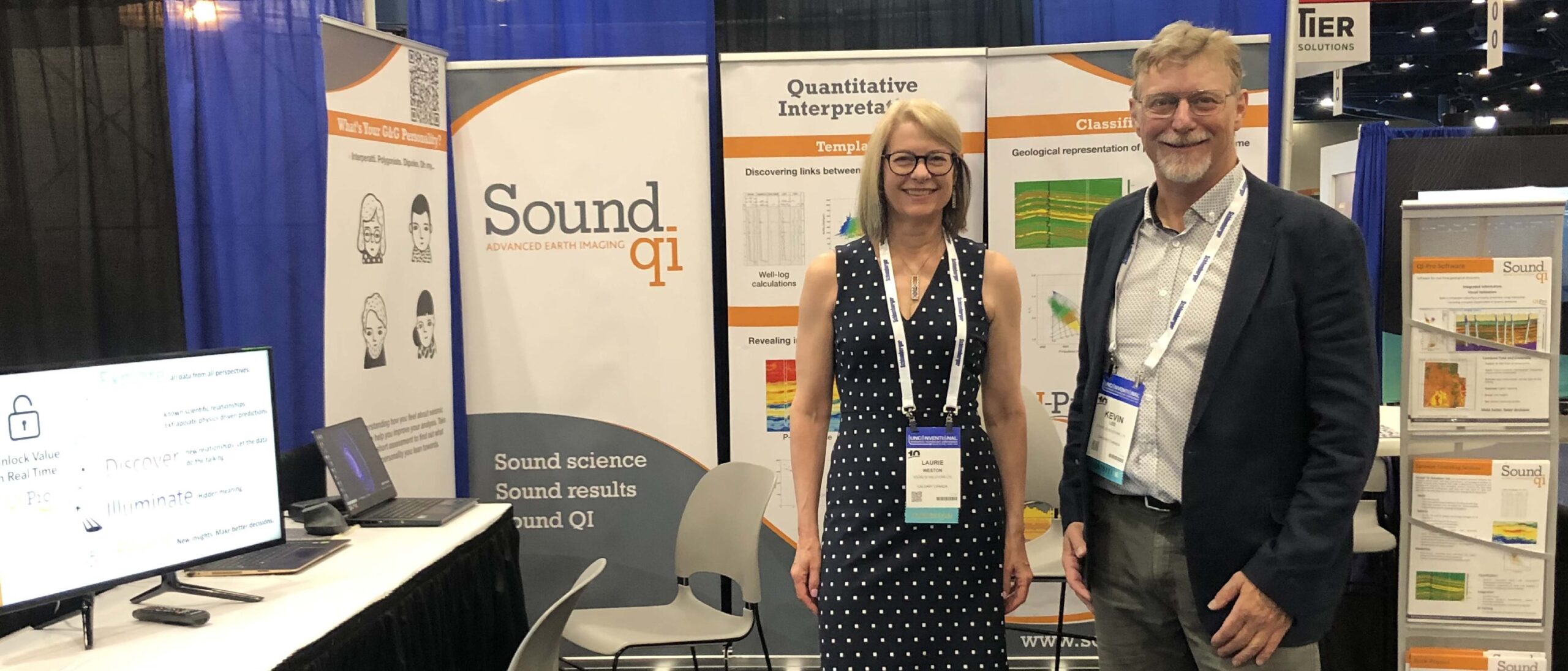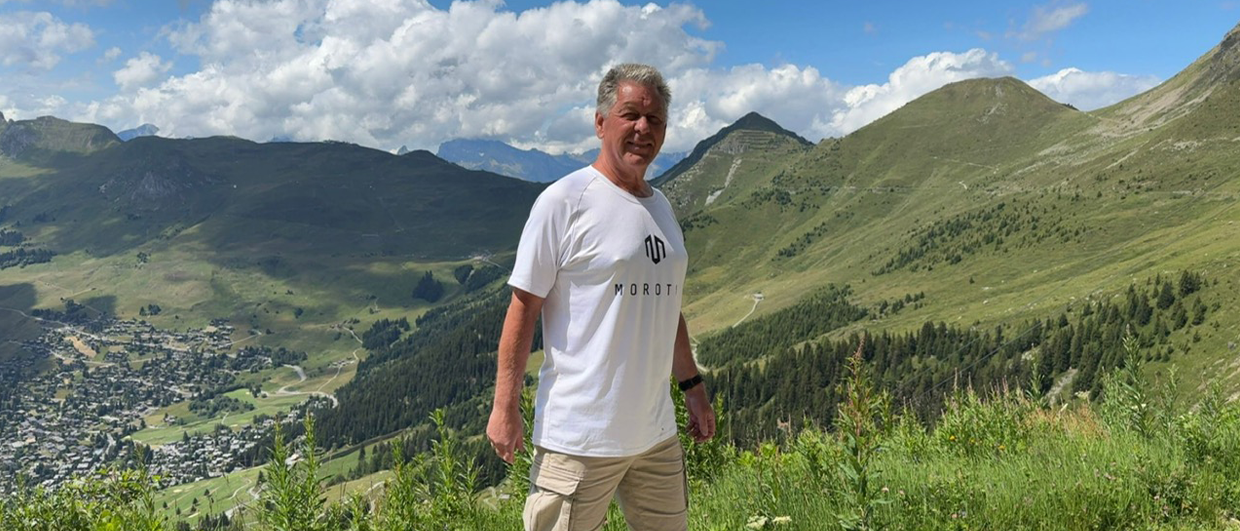Denise Cox, President of Storm Energy and President-Elect of the AAPG, loves geology and wants to let a global audience understand more about the role of geoscience in energy solutions.
Introducing Denise Cox
On location in West Texas and ‘in the pink’ with a new discovery, 2014. Photo credit: Denise Cox.
Although she did not work it out for a while, Denise Mruk Cox was destined to be a geologist and world traveler. Geology was written in the stars for her: she was told by an astrologist while still at school, “You enjoy working with the Earth.”
From mucking around in the mud in her backyard as a toddler in southern central New York, she rapidly progressed to hiking the tree-covered glacial hills around her home and to exploring the Devonian outcrops of the Finger Lakes region. When she wasn’t outside she had her nose in a book, her other favorite pastime, exploring other continents and other times.
Geological Background
An early interest in mud rock! Photo credit: Denise Cox
Coming from what she describes as “very modest roots”, Denise was of the first generation in her family to go to university. It was not until her second year at the State University of New York at Binghamton that she took a class in geology – and even then, it was only because in her first year she balanced the science and math subjects at which she excelled with an elective course in Arabic; it was her Arabic professor who recommended she tried geology. Almost immediately, she knew geology was what she wanted to do.
“I love that geology is the marriage of science and art,” Denise explains. “You need creativity to see something on the Earth’s surface and know how it looks in the subsurface, and science and math to support that vision. Geology is at that intersection – I believe in STEAM (Science, Technology, Engineering, Arts and Mathematics), not just STEM. Geological features and processes can be described equally by drawing a picture, or by using scientific and mathematical formulae. Interestingly, I find that many geologists have artistic skills, particularly music. The people in geology are also diverse and from such a range of backgrounds that they reflect the diversity of the subject itself.”
Denise graduating from Colorado University in 1985. Photo credit: Denise Cox.
Despite her late start in geology, Denise graduated with an Honors BS in the subject and was awarded the Glenn G. Bartle Award for excellence in geology. Her career began as a technician with the US Geological Survey in Denver, Colorado on a 9-well Uranium and Thorium coring project. She soon realized that to have a career as a geologist, she would need a further degree. She attended the University of Colorado, Boulder, a perfect choice of location given her interest in the outdoors, and took a masters in geology, which included courses in petroleum geology and a thesis on the diagenesis of the Permian Capitan Formation in West Texas. Whilst completing her research she was also working part time as a reservoir geologist at Marathon Oil’s Denver Research Center (DRC), where she further developed her interest in carbonates. After graduation in 1985 this led to a full time offer of work at the DRC and ultimately a 20-year career with Marathon, in Denver and Midland and Houston, Texas where she specialized in the application of new technology to carbonate petroleum reservoirs and later the evaluation and development of unconventional reservoirs.
The Importance of Networking in Oil & Gas
Denise presented with the Glenn G. Bartle Award for excellense in Geology on graduating with an Honors. Photo credit: Denise Cox.
The job with Marathon had initially come about through people Denise met during one of the industry-led seminars during her masters study. She is a great believer in networking and describes herself as a ‘connector’. “I hear many ideas but when I make a connection on how it can be developed and implemented, I want to share it with the world.”
Denise provided some insight on making connections at work. “When I started a new job I would do ‘rounds’, finding out what everyone’s role was in the group and what were their processes – types of maps, cross-sections, analyses – for exploration or development. Because of this I knew what person A was doing and how it might help person B, if only C would provide the data.” This proved very useful when the exploration industry began to introduce less rigid subject-led management structures, and probably resulted in Denise being chosen to lead one of Marathon’s first multi-disciplinary teams.
Denise working in Marathon’s office in Midland, Texas in 1988. Photo credit: Denise Cox.
“One of the best pieces of advice I can offer young and experienced people alike, is to network and make connections,” she says. “When you’re hired or transferred into a new group, talk to the people you work with and question them about what they are doing, and why. It helps you to understand their perspective and recognize how your knowledge and project contribute to the team’s objectives. And when you find someone really passionate about their job, learn from them!”
What else would Denise suggest to young people starting out in the industry? “To those already working: don’t be afraid to say, ‘I don’t understand’. Accept and learn from your mistakes – we all make them. I’ve drilled my share of dry holes; the important thing is to understand why, so the next well gets drilled and is a success.
Unplugged and hiking with Maggie in the Colorado mountains, 2002. Photo credit: Denise Cox.
“Also, try to take all the experience and leadership opportunities offered to you. You may not feel you are ready for a transfer or management role, but if someone approaches you with one, it is because they’ve seen technical or leadership traits in you that mean you ARE ready.
“To undergraduate students I would suggest that they get the best fundamental geoscience education that they can at a college or university which has the best connections to the industry where they want to work. Good choices lead to good choices.” Denise adds: “If possible, take courses in data analytics and geostatistics; these are really important to have on your resume in today’s job market.
“For graduate studies, the best geoscientists are the ones who have seen the most rocks, so make sure you get out in the field and if possible do a field or core-based thesis.”
Career Choices in Oil & Gas
In 2004, Denise decided not to permanently relocate to Houston when Marathon consolidated their production offices there. She joined her husband, Kurt, also a geologist, as a technical consultant for Storm Energy, the company he built through an acquisition and successful prospects. They moved to Panama City and she now heads up the company, as Kurt has a new career as a writer.
Denise’s husband, Kurt Cox when he started Storm Energy with an acquisition of an interest in Moore’s Orchard field, 1997. Photo credit: Denise Cox.
“Storm Energy has what I think is a unique business model,” she explains. “We started as a consultancy doing technical evaluations and then putting prospects together in the Gulf Coast and Permian Basin. This has evolved into working with expert partners – geophysicists, petrologists, engineers, and landmen – to undertake technical and economic evaluations of both conventional and unconventional US projects for acquisition or investment. We are able to secure partnerships for project operations and financing and have not yet used the traditional private equity route to secure funding. I think this partnership model should appeal to younger geologists with about 10 years’ experience who have an idea they want to develop. Again, it’s all about connecting with the right people to work together – and doing what we all love: exploration and maximizing recovery of reserves!”
Denise likes to refer to herself as the ‘spatula’ of the oil business – she likes to get the last drop of oil out of existing oil fields.
“While I was happy in the corporate world, and had corporate management aspirations, there are a lot of advantages to my role as a small independent. I love the strategic side of the business, and the fact that we make our own policies – such as moving the office to Colorado for a couple of months every year, to unplug, go back-packing, and hunting for something other than oil.” Among her many interests, Denise is also an avid wild mushroom collector.
Leadership Roles in the Energy Industry
AAPG President-Elect, Denise Cox. 3rd Female President in 100 years. Photo credit: Denise Cox.
Denise has always been active in professional societies such as the American Association of Petroleum Geologists (AAPG), Association for Women Geoscientists (AWG) and the West Texas Geological Society. She was President of AWG in 2014–15 and is at present President-Elect of AAPG, due to take up the presidency in July this year – only the third woman in the 100-year history of the society to have this role. I ask why she decided to stand for election to this prestigious post.
“Firstly, because I was asked, and as I said, my advice is not to turn down an opportunity to lead,” she replies. “Also, I love what I do, so this role gives me a chance to communicate a global perspective of geoscience and the importance of the petroleum industry in energy solutions. The AAPG is US-based, but importantly has Regions in Africa, Asia-Pacific, Canada, Europe, Latin America and the Caribbean, and the Middle East; AAPG truly has a global reach. After all, geology crosses borders; it is a systems science, not a geographically-bound one. For example, there are Paleozoic geological systems throughout the world and we can benefit from the knowledge of petroleum systems say in the Permian of West Texas compared with the Southern Permian Basin in Europe.
Collaborating for Energy Solutions
Denise Cox receiving “Distinguished Service” aware in 2015. Photo credit: Denise Cox.
“I also agreed to stand for AAPG President because I get to connect with current and future members,” she continues. “It’s great to realize how many people are working on energy solutions at any time, somewhere in the world! On a recent AAPG trip to the Middle East I was impressed by the talented and well-spoken men and women I met. They understand their crucial role as geoscientists in the petroleum industry and are passionate about providing new ideas to explore for and develop low cost, reliable energy. The women were particularly interested in career options, so they were pleased to see a woman in a prominent leadership position.
“I am also keen to use the role of AAPG President to work cooperatively with other professional organizations to talk about ‘sustainability’. Geoscientists as well as petroleum companies have an important part to play in global energy solutions. With our subsurface knowledge and technical abilities, we can help address the economic, environmental, and social issues that face the petroleum industry and the next generation. To that end, I’m working with Max Brouwers from Shell on an AAPG Energy Transition Forum – A New Era for Geoscience – to be held in Amsterdam later this year.”
Giving Back to the Energy Industry
Denise as AAPG Secretary, with Charles Sternbach, DPA President, connecting with students at AAPG’s International Convention in Singapore 2012. Photo credit: Denise Cox.
“Like many people, I want to give something back,” Denise says. “I was keen to participate in organizations like the AWG because I was the recipient of a Chrysalis Scholarship to help finish my masters, so I know how vital these funds are. As a past Chair of the AAPG Grants-in-Aid Committee, I also established a scholarship in my family’s name, ‘the Mruk Family Grant’. We need to make sure that scholarship funds are available so future geoscientists can answer some of the questions that we’ve yet to address.
“I know I’ll never have enough time to do everything that interests me, but if I’ve made enough connections to have made a difference – then I’ll know I’ve helped the next generation to ‘go forth and make the world a better place’,” she concludes.
You might also like to read…
Fun, Corporation & Risk-Taking
Previous President of the AAPG: Lee Krystinik.
On AAPG, Oil, and Geoscience
Previous President of the AAPG, Dr. John Lorenz, speaks of the lack of public data available to oil & gas professionals.
Leading a Global Organisation
Previous president of the AAPG, Ted Beaumont, reviews oil & gas in 2012 and 2013.
AAPG’s 100th Anniversary Celebration
It all began in 1917, 100 years on – read all about the global organisations 100th birthday celebration in 2017!





